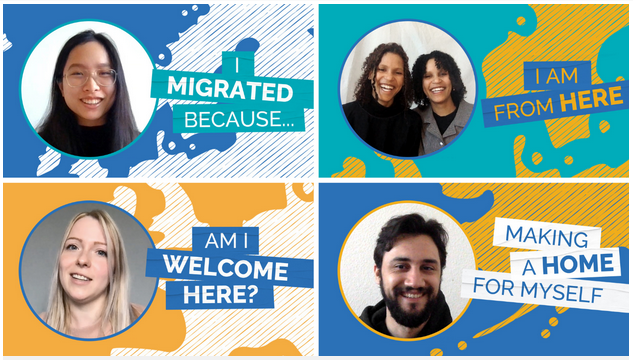Like many western countries, Germany is becoming increasingly multicultural and diverse. Sophia Burton from Migration Matters explains how we can raise awareness about the complex reality of migration in the classroom and help students have healthy, evidence-based discussions about it.
Do you see Germany as a country of immigration? This question can be looked at through various perspectives:
- how much diversity we (think we) see on the streets around us
- whether political parties acknowledge immigration’s importance and create laws and policies around it
- or even whether someone personally feels welcome as an immigrant
If we want to focus on the numbers, they can tell us the following: About 14% of Germany is foreign-born, a figure comparable to that of the United States. And over one fourth of Germany’s residents have a so-called “migration background”, a term denoting someone with at least one parent who did not receive German citizenship by birth.*
Students in Germany indisputably live in a diverse society. However, the reality of Germany as an immigration society is not systematically reflected in curricula.**
Thus, migration-related challenges and issues of diversity and identity are rarely addressed. As a result, students often have limited tools to participate in debates about diverse and inclusive societies. So how can we introduce migration as a topic in the classroom and foster healthy, nuanced discussions about it?
Migration: Go beyond pro and con…
Migration is often presented as a divisive topic with a pro vs. con framework that does not honor the complexity of the debate nor people’s far more nuanced perceptions on the topic. Very few people feel entirely “pro” or “con” about migration – they can see both benefits and challenges.
Since migration is a topic with no clear answers or solutions, we don’t need to attempt to solve the debate in every discussion. It can be more productive to acknowledge we don’t have all the answers and share different arguments around topics like integration, borders, climate change’s relationship to migration, or identity.
The tools students can learn through these kinds of open discussions can also transfer to conversations about other difficult topics.
… but keep it evidence-based
While it’s important to acknowledge various opinions and perceptions around migration to be inclusive of different views and spark discussion, it is also critical to keep the discussion evidence-based. Incorporating facts, research studies, and scientific findings is one big part of this equation. There are scholars from various disciplines who research migration from the perspectives of social science, political science, psychology, and more.
Studies and research findings alone are however often not enough to spark debate – teaching materials should have an approachable and accessible character to appeal to young people.
Incorporate a variety of “expert” voices
Sharing multiple voices with students can make the topic of migration more approachable and accessible. Personal stories, for instance, can help capture students’ attention and draw them into the topic (Example: Our I Am European series that shares the stories of 17 young people across Europe).
Debates about migration and refugees are also often lacking those most affected: migrants and refugees. At Migration Matters, we believe that those with lived experience are expert voices in their own right.
Incorporating digital storytelling into the classroom
Digital storytelling can be an effective tool for building understanding and empathy when it comes to complex topics like migration. It can make evidence and research more accessible and challenge misconceptions and stereotypes. Amplifying the voices of migrants and refugees helps to encourage dialogue and the sharing of diverse perspectives.
It can be something you “import” into the classroom (Migration Matters has over 150 videos for you to pull from!) or a task you can have students do on the topic, creating their own digital stories – even in the very basic form of a TikTok or Instagram reel – about their communities and surroundings.
Start with a bold statement, end with a question
It can be tempting to start off a discussion with a question and try to end with an answer. At Migration Matters, we tend to format our educational videos and materials in the reverse way. We start with a bold statement, either from someone on the street or an academic or migrant, and end our videos with a question. The former serves to provoke interest and kick off debate and the latter encourages reflection and further discussion.
About Migration Matters and getting involved
Migration Matters e.V. (MM) is a media NGO founded by four migrant women in 2016 in response to media coverage about the so-called ‘refugee crisis’ with the mission of helping the public navigate complex issues related to migration.
Through media productions and events, the MM team makes research, evidence, and original perspectives on migration and diversity issues accessible to the public to encourage evidence-based debate and, ultimately, to combat increasing polarization and discrimination.
Get in touch with us if you’re interested in learning more, inviting us to your classroom, or have feedback on our videos: team@migrationmatters.me. We are currently looking for a handful of schools in Berlin for which to conduct migration-focused workshops in 2023.
If you enjoyed this article, you might also like Richard’s story of teaching English for charity in the Philippines.
References
*Statistisches Bundesamt: Mikrozensus, 2021
** MIDEM Lehrplanstudie – Migration und Integration, 2021

Sophia Burton
Sophia Burton is an educator and the co-founder of Migration Matters. You can find out more about her and her work on LinkedIn.










It would be interesting – and provide some needed balance – to read some differing, perhaps more grass-roots classroom perspectives on the topic of migration in Germany and the situations it puts teachers in (and perhaps also non-migrant students?), esp. considering that many English teachers are youngish ‘migrants’ themselves who often know little about the country, its history, and its culture. The tendency among the globalist-minded language teaching community is to view any ‘friction’ that emerges between ‘native’ Germans and ‘migrants’ as the ‘fault’ of the ‘natives,’ who are simply too benighted to appreciate ‘diversity’ and ‘multiculturalism’ – the many benefits of which it’s our job, as teachers, to impart. There’s something more than a little ‘colonial’ about such an attitude. I’ll be curious to find out whether the Migration Matters videos also include viewpoints that are critical of mass migration and its effects on both the ‘gaining’ and ‘losing’ societies.
Hi Christof, thanks for your comment. At Migration Matters we aim to highlight the complexities within the migration debate rather than directly ‘praise’ or ‘criticize’. We do not consider ourselves an advocacy organization that is trying to convince everyone that migration is a good thing, rather that it is normal and something far too complex to boil down to a pro vs. con framework. Similarly, as you say, the frame of “migrants” vs. “natives” is not helpful nor is it accurate.
While we do very much believe it is important to call out and denounce things like racism and discrimination, we also know it is normal that host societies have concerns and worries about migration and diversity and disregarding these does not help people feel comfortable having discussions about it. There is a lot of research that supports this. What we want is for the debate to be evidence-based and include expert voices (researchers/academics but also those with lived experience) and not over-simplified, politicized, or sensationalized.
Here are some links to videos of ours that include a wide range of public opinion on topics like integration, migration, and nationalism:
https://youtu.be/WfK__6LJyws
https://youtu.be/8ZXBrR4HWO0
https://youtu.be/lG2bufjLfgk